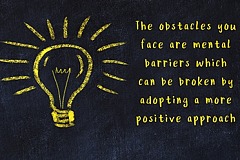Emotional outbursts at work can be embarrassing and stressful for both the person experiencing the outburst and their coworkers. They can also have negative consequences for your career, as they can damage your professional reputation and strain your relationships with colleagues.
If you've had an emotional outburst at work, it's important to take steps to recover and prevent similar incidents in the future.
Acceptance and Responsibility
First, it's important to acknowledge and accept that you had an emotional outburst. This can be difficult, especially if you're feeling ashamed or embarrassed, but it's an essential step in the recovery process.
Ignoring or pushing aside emotions can have several downsides. One of the main drawbacks is that it takes up cognitive resources. When we try to suppress or ignore our emotions, we are essentially telling our brains to stop processing them. This requires a lot of mental effort and can drain our cognitive resources.
Another downside of ignoring emotions is that it can lead to emotional suppression. Emotional suppression is when we try to hide or suppress our emotions, often because we think they are inappropriate or undesirable. This can be harmful because it prevents us from fully experiencing and processing our emotions. Emotional suppression can also lead to a range of negative outcomes, such as increased anxiety, depression, and difficulty forming close relationships.
Ignoring or pushing aside emotions can also have negative effects on our physical health. Research has shown that suppressing emotions can have hurt our immune system and increase our risk for various health problems. For example, people who suppress their emotions are more likely to experience headaches, stomach aches, and other physical symptoms.
Avoidance can be harmful because it takes up cognitive resources, can lead to emotional suppression, and can have negative effects on our physical health.
Instead of trying to downplay or deny what happened, take responsibility for your actions and recognize the impact they had on others. This can help you to learn from the experience and develop strategies to prevent similar outbursts in the future.
Get Help, Support
Next, consider seeking support from a trusted colleague, friend, or family member. They can provide a listening ear and offer emotional support as you work through your feelings and try to move forward.
If you don't feel comfortable confiding in someone you know, consider seeking support from a professional therapist or counselor. They can help you explore the root causes of your emotional outburst and develop coping strategies to manage your emotions more effectively in the future.
It's also important to apologize to anyone who was affected by your emotional outburst. This can be difficult, but it's an important step in rebuilding trust and repairing relationships. Make sure to be sincere and take full responsibility for your actions. Offer to make amends and demonstrate that you're committed to improving your behavior in the future.
Recovery and Prevention Strategies
In addition to seeking support and apologizing, there are other strategies you can use to recover from an emotional outburst at work and prevent similar incidents in the future.
These include:
- Recognizing and differentiating between your emotions. This is an important skill that can help you better understand and manage your thoughts and behaviors.
To recognize your emotions, you first need to be aware of your body's physical responses to different stimuli. For example, you might notice that your heart rate increases when you feel angry or that your stomach tightens when you feel anxious.
Paying attention to these physical sensations can help you identify the emotion you are experiencing.
- Labeling your emotions as they arise. This involves simply acknowledging the emotion you are feeling and giving it a name, such as "I am feeling angry right now" or "I am feeling sad." By labeling your emotions, you can better understand and identify them.
- Identifying triggers. Take some time to reflect on what caused your emotional outburst. Was it a specific event, person, or situation? Understanding your triggers can help you anticipate and prepare for them in the future, so you can manage your emotions more effectively.
- Practicing self-care. Take care of your physical and emotional well-being by getting enough sleep, eating well, and finding ways to relax and de-stress. This can help you to feel more in control of your emotions and better able to handle challenges and setbacks at work.
- Learning to express emotions effectively. Instead of bottling up your emotions or reacting in an explosive way, learn to express your feelings in a healthy and appropriate manner. This may involve using "I" statements to express your perspective or seeking out a private place to take a break and calm down if you're feeling overwhelmed.
- Seeking feedback. Ask for feedback from your supervisor or a trusted colleague on how you can improve your emotional self-regulation at work. They may have suggestions or insights that can help you better manage your emotions in the future.
- Seeking additional training or support. If you find that you're struggling with intense or frequent emotional outbursts at work, consider seeking additional training or support. This could include taking a course on stress management or seeking out a coach or mentor who can help you to develop coping strategies.
Managing your emotions at work can be challenging, but it's an important aspect of professional success. By taking steps to recover from an emotional outburst, seeking support, and developing strategies to manage your emotions more effectively, you can improve your relationships with colleagues, enhance your reputation, and be more productive and successful in your career.














